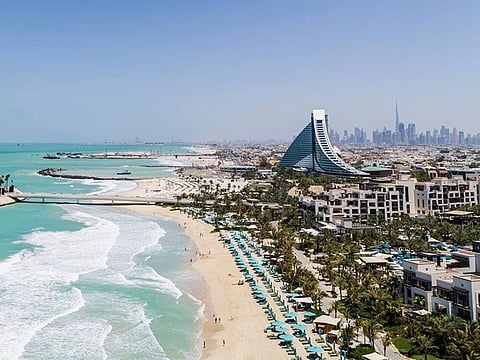Dubai’s hotels will see a return to pre-COVID occupancy rates by 2023: KPMG
Travel restrictions to India and UK will weigh on occupancy in summer months

Also In This Package
Dubai: Dubai’s hotels saw occupancy rates of nearly 60 per cent in the month of April after setting a 12-month high figure during the winter.
Occupancy rates surged to 69 per cent in December after “nosediving” to less than 25 per cent during the initial outbreak of the virus last year, according to a KPMG hospitality industry report.
The emirate’s occupancy levels are “significantly” higher than the Middle East and Africa region’s 2020 rate of 49 per cent, said KPMG.
Predictions for 2021
KPMG’s survey found that 75 per cent of hotel operators anticipate the vaccine to be effective in boosting occupancy rates. In fact, half of those surveyed expect occupancy rates above 60 per cent in FY 2021 and 75 per cent expect occupancy to return to pre-covid-19 levels by 2023.
Among operators of Dubai-based properties, half anticipate an average daily rate (ADR) of $120-150 in 2021, with an additional 25 per cent expecting $150 or higher. Consistent with the presumed occupancy rates’ timeframe, 83 per cent expect average daily rates to return to pre-Covid-19 levels in 2023.
Revenue jump
Meanwhile, revenue generated by hotels per available room (RevPAR – key industry performance metric - in Dubai jumped by more than 550 per cent during 2020.
After hitting a low of $17.2 at the start of the pandemic, RevPAR reached a peak of $114.7 in December, coinciding with the holiday period. As of April 2021, RevPAR for Dubai stood at $92.9.
Average daily rate (ADR) for hotels in the emirate also gained momentum toward the end of 2020, hitting $165.9 in December. The new year witnessed a decline however, with the April rate at $156.4.
Recovery in progress
Looking at the key metrics, it is clear that Dubai’s hospitality industry is in the process of recovering after a significant drop across indicators, said KPMG. “However, while luxury, beachfront and desert resorts were able to reduce cost and attract domestic guests, budget and business hotels have struggled to maintain occupancy and ADR.”
Current travel restrictions to key source markets such as India and the UK will put “pressure” on occupancy in the summer months, said the consultancy.
Not all gloom
KPMG said that demand for staycations will further increase even during weekdays, with school holidays starting in July. “In addition, vaccination programs continue to expand, demand related to Expo 2020 will increase, and travel restrictions will gradually ease.”
As a result, occupancy and rates are expected to continue to improve toward the latter half of the year, the report said.
Domestic travel has taken the center stage during the pandemic. While international arrivals plummeted, the number of room nights sold to domestic tourists throughout the UAE surged from 2.74 million in 2019 to 5.68 million in 2020 —an increase of 107 per cent.
Domestic room nights accounted for 78 per cent in 2020 compared with just 19 per cent in 2019. Tourism spending from domestic tourists stands at Dh41 billion.
Sign up for the Daily Briefing
Get the latest news and updates straight to your inbox








